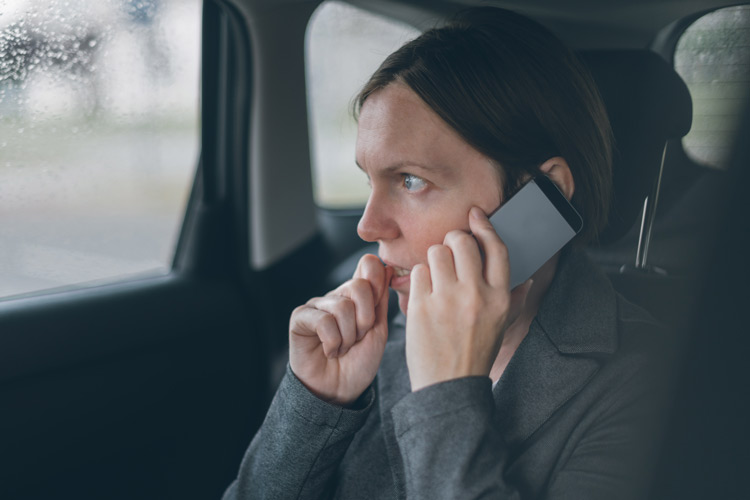Anxiety Disorders & Addiction
 It is normal for a person to feel anxious in certain circumstances, such as before a first date or job interview. However, some people struggle with anxiety that is more prolonged and difficult to control. Anxiety disorders are characterized by symptoms such as:
It is normal for a person to feel anxious in certain circumstances, such as before a first date or job interview. However, some people struggle with anxiety that is more prolonged and difficult to control. Anxiety disorders are characterized by symptoms such as:
- Worry and fear that never seems to go away or is out of proportion to the circumstances
- Feelings of impending danger, panic, or doom
- Avoiding people or places that trigger anxiety
- Trouble sleeping
- Chronic fatigue
- Gastrointestinal distress
- Difficulty concentrating at work or school due to anxiety
If you suffer from an anxiety disorder, you are not alone. According to the National Alliance on Mental Illness, 19.1% of American adults have a diagnosed anxiety disorder. While not all people with anxiety disorders will go on to develop problems with drug or alcohol addiction, it is important to realize these individuals do face an increased risk of developing a substance use disorder.
Different Types of Anxiety Disorders
Anxiety disorders can take several different forms. Some common types of anxiety disorders include:
- Generalized anxiety disorder (GAD). This condition is characterized by severe distress related to common everyday concerns.
- Panic disorder. People with panic disorders suffer from sudden feelings of intense anxiety and fear that peak within minutes but cause them to change their daily routine to minimize the perceived risk of future attacks.
- Post-traumatic stress disorder (PTSD). This is an anxiety disorder related to a traumatic event such as military service, being the victim of a crime, or living through a natural disaster.
- Obsessive-compulsive disorder (OCD). People who have this type of anxiety disorder have intrusive, recurring thoughts that lead to compulsive and repetitive behaviors or rituals centered around concerns such as safety or general cleanliness.
- Social anxiety (social phobia). With this type of anxiety disorder, a person feels extremely self-conscious around others and avoids social situations as a result of their anxiety.
Emotional Distress Can Lead to Self-Medicating with Addictive Substances
Anxiety disorders can cause a significant amount of emotional distress. Sufferers may feel ashamed or embarrassed. They may worry about how their condition affects their relationships with friends, family, and loved ones. They may struggle to advance in their careers and believe that anxiety is keeping them from reaching their full potential.
To cope with the emotional distress caused by an anxiety disorder, a person might:
- Overuse prescription medications such as Xanax or Ambien due to trouble sleeping
- Use alcohol to “take the edge off” when they are feeling irritable, agitated, and restless
- Use stimulants such as Adderall and Ritalin to cope with fatigue and difficulty concentrating
- Turn to hallucinogens such as PCP or ketamine to dissociate from reality
Self-medicating with addictive substances turns into a vicious cycle. There is a temporary sense of relief, but it’s followed by a “crash” when the effects wear off. Over time, tolerance for the substance increases, and a person starts to experience noticeable withdrawal symptoms when they’re not drinking or using. This pattern of continued misuse can lead to addiction, as well as a general overall worsening of a person’s mental health.
The Brain Changes Associated with an Anxiety Disorder Can Make a Person More Vulnerable to Substance Abuse
Anxiety disorders can also increase a person’s addiction risk because of the changes that occur in the brain when a person spends a prolonged period of time in an anxious state. When the body is faced with constant anxiety, the amygdala grows larger. An increase in the size of this tiny almond-shaped gland that regulates emotions and mood leads to hyperactivity. When this is combined with a diminished connection to the prefrontal context, it becomes more difficult for a person to reason rationally. This increases the risk of substance abuse and other types of impulsive behavior.
Getting Help
Anxiety disorders and substance use disorders are both chronic conditions that can’t be “cured” in the traditional sense. However, proper care can help individuals with these co-occurring conditions learn to effectively manage their symptoms.
At St. Joseph Institute for Addiction, we provide evidence-based treatment personalized to fit the unique needs of men and women with substance use disorders and co-occurring anxiety disorders. Clients at our Pennsylvania residential addiction treatment center have access to a full continuum of care, including detox, cognitive behavioral therapy, medication-assisted treatment, holistic therapies, and 12-Step support. Contact us today to learn how our experienced addiction professionals can help you build the foundation for a lasting recovery.
Considering a Pennsylvania addiction rehab? To learn more about SJI Pennsylvania addiction rehab, and our programs, please contact us at (814) 228-8881.

